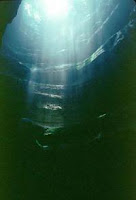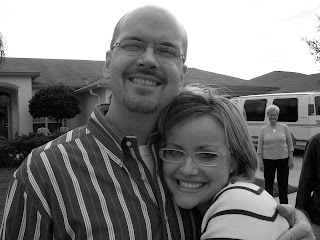Dec 28, 2006
More






Dec 27, 2006
Happy Christmas! 06
Dec 24, 2006
A change

It sounds like I'm getting ready to go on a mission trip.
As I've visited and reflected one thought has struck me. There are two very distinct versions of Christianity and I witness both in people I know. There is one version of Christianity that is very good - good church attendance, good deeds, good prayer life, good theology, good fellowship. There is nothing overtly amiss in this practice of Christianity. But there is something intentionally escapist. There is a neglect of radical sacrifice; of violence, of death to self. Sometimes I say to myself, "I wish I could be a good Christian." Those who know me know that I don't fit the stereotype well. I wish I could go through life and think God is good and do enough and be satisfied.
And this is why I will go and I will live and I will die for this cause. This is why I will forego other dreams, alternative life-plans, ambitions, goals... I surrender them. Because those concepts are people and those people mean too much.
Dec 13, 2006
Eyes
It was an amazingly non-judgmental, first-person narrative of a 13-year old girl living with a junkie dad, on and off the streets, practicing juvenile prostitution, run-ins with social services, etc. It's set in Montreal. It's really powerful.
I don't give children enough credit. Their perspective is so paradoxical: wise and yet naive. They see a lot and understand a lot... but their labels are so different than our own.
Here's the quote that encapsulates O'Neill's goal to me -
"He said that if you were able to look at the crows really closely, you would see that their eyes were stolen baubles, like buttons or marbles. To get real eyes, they had to steal them from children. Older people's eyes were too set in their ways of looking and would be no good for a crow. That's why people wouldn't let their children out after dark. The crow who stole the eyes of a real child was king. With a piece of plastic they could just see what was in front of them, but with a child's eyes, they could see the whole world."
I wonder what Mitchell's eyes are seeing right now -- he's coming over to me for a hug every thirty seconds. He's grouchy.
(I realize that this blog has become a book review. It's just that my own thoughts are too muddled with the stress.)
Dec 8, 2006
It is never fun to die.

Dec 2, 2006
A Melancholy Glamour

Isaiah 42:6b & 7 - "I will give you as a covenant for the people, a light for the nations, to open the eyes that are blind, to bring out the prisoners from the dungeon, from the prison those who sit in darkness."
This makes me think of Plato's Cave allegory - all are hidden, chained in this darkness... it is familiar and it is comfortable... the shadows seem real and satisfactory - it is enough of a life. Then, this nagging voice, this freed comrade beckons them into the unknown beyond. But it is frightening; the light outside hurts the eyes; alarms the senses.
It is so easy to sit in the dungeon - in the impenetrable fortress of my own version of truth and refuse fresh light.
I glamorize this darkness. I sit here and enjoy my agony, crying, "Why don't you take away my pain, God?" I scream, "It hurts so much!" The not knowing, the blindness, the darkness... "Why do you hide your face from me?" He's silent. So silent.
I glamorize the darkness I tend toward but even as I do it my spirit craves life.
"Ladies and gentlemen/People of the darkness/You've been running for a very long time..."
(Jason Upton - "Psalm 2:12")

Living in peace with the mysteries and shadows of life and hiding behind them are two very different things. When I choose the latter I forfeit the joy of discover and the exposure of my own soul to trasnforming truth.
"Search me and know me, O God."
It is so 'natural' to slide into easy, comforting thoughts; repetitious, logical living; perfunctory but peaceful religion.
It is completely terrifying to contemplate the reality of God.
"Some say 'I'm a man of the evening.'/Others say, 'I'm a lady of the night.'/But God says, 'I'm your Creator,'/And nobody's faster than the speed of light/I'm calling." (ibid)
 I can settle down in darkness - grasping small joys - or I can brave the blinding light and receive joy that is unspeakable and full of glory.
I can settle down in darkness - grasping small joys - or I can brave the blinding light and receive joy that is unspeakable and full of glory."...he who is the blessed and only Sovereign, the King of kings and Lord of lords, who alone has immortality, who dwells in unapproachable light, whom no one has ever seen or can see. To him be honor and eternal dominion. Amen."
(I Timothy 6:15b-16)
Lingering questions

I'm wrestling though this big-time.
(I suppose this ultimately stems from questions about the origin of evil - for background).
My thought: pre-fall creation wasn't static but dynamic, with potential to grow & reproduce. In other words, God didn't create a final product; he created the "first batch."
My question, then: did creation (animals, plants, the ecosystem, as it were) ever exist without death? Because that cycle and decomposition - fertilization - new life - is an integral part of the system as we know it empirically and scientifically (and experientially, for that matter).
(The concept of death -> life and that cycle is rife through creation... it's the very essence that allows the ecosystem to perpetuate itself and thrive.)
Unfortunately, it seems that most people's definition of pre-fall creation excludes any allowance for dynamism (especially anti-evolution thinking). Man couldn't die yet... but if man's decomposition is part of the "circle of life" - how is that possible? Can creation exist independently of human death?
If creation never existed without this death then spiritism, animism & the eternality of anything other than human beings is philosophically & logically impossible. (T or F?)
Implications: 1. spiritism ("mother nature" etc) and eternal spirits existing in plant and animal life is discredited. 2. we, as caretakers over our dominion of the earth, are responsible first and foremost (on a social level probably) to preserve and defend the *systems* and maybe not the *specifics* of nature. So, it's not so much this species or that region... it's the entire motion of creation, of which we and all living things are a part, and in which death plays an integral part.
We live in a society that is hell-bent (haha) on preventing death... but death is natural and necessary.
So where did death come from?
How did death work in the garden?
And is physical death really part of the curse?
I know this was all over the place. I'm crazy.




 stockings = McCarty Christmas.
stockings = McCarty Christmas.







